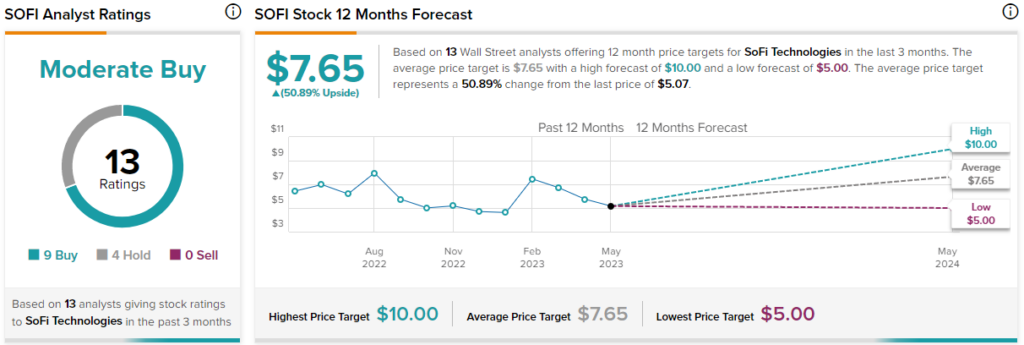On the surface, financial technology (fintech) specialist SoFi Technologies (NASDAQ:SOFI) seemingly should rise on the facilitation of next-generation banking solutions. However, faced with the unprecedented COVID-19 crisis, management began pivoting heavily toward personal loans. Though the process kept the lights on, the decision could end up imposing a long-term liability. Therefore, I am bearish on SOFI stock.
Elevate Your Investing Strategy:
- Take advantage of TipRanks Premium at 50% off! Unlock powerful investing tools, advanced data, and expert analyst insights to help you invest with confidence.

Recently, TipRanks reporter Vince Condarcuri mentioned that Wedbush’s David Chiaverini changed his rating on SOFI stock to Sell from Hold. In addition, he assigned a price target of $2.50 a share. At writing, this forecast represents a downside risk of more than 50%.
In particular, the analyst stated that fee income from loan applications and sales could soon crumble. Since the company isn’t profitable, Condarcuri writes, “this decline in income could delay profitability just enough to where capital will need to be raised at unfavorable terms.”
However, another major headwind affecting SOFI stock centers on the significant rise and allocation of the fintech’s service portfolio to personal loans. If SoFi does find itself needing capital at less-than-ideal terms, its personal loan exposure could hurt its share value.
Personal Loans Skyrocket
While an analyst downgrade certainly didn’t help SOFI stock, that wasn’t the only headwind stymieing its forward progress. On May 15, when shares tumbled, JPMorgan Chase (NYSE:JPM) analyst Reggie Smith explained that the fintech’s dramatic rise in personal loan obligations may be a sign of future losses.
Writing for TipRanks last year, I pointed out multiple times that the acceleration of personal loans presents a significant concern. In the second quarter of 2022, personal loan originations almost doubled to $2.47 billion on a year-over-year basis. In Q3 of last year, personal loans represented nearly 81% of total loan originations.
According to SoFi’s presentation for Q1 2023, total loan originations amounted to nearly $3.57 billion. Of this amount, $2.95 billion, or 82.7%, stemmed from personal loans. In sharp contrast, student loans only make up 14.7%, while home loans sit at a forlorn 2.52%.
What’s more, in the year-ago quarter, personal loans accounted for just under 61% of total loan originations. Further, student loans came in at 29.6%, while home loans landed at 9.4%. To be fair, the COVID-19 disruption sparked SoFi’s pivot toward personal loans. However, the allocation is now intensely imbalanced, posing longer-term risks for SOFI stock.
A Double-Edged Sword for SOFI Stock
On the positive end of the scale, SoFi personal loan borrowers must meet minimum qualification requirements. Available data indicates that the average SoFi borrower has a credit score of at least 700. Further, the reasons for the loans most commonly center on credit card consolidation, home repairs, and emergencies. Plus, management kept the lights on with these lending products. However, the framework may become a double-edged sword.
Fundamentally, personal loans are unsecured. Therefore, if a borrower can’t pay back the loan, there’s not much that the bank can do. On the other hand, for home mortgages, the underlying financial institution can foreclose on the property. With any luck, the home value might rise, thus mitigating the impact on the lender.
However, it’s difficult to say the same about personal loans because the underlying catalyst has often been consumed. In other words, a bank can’t foreclose on a home repair or an emergency ride in an ambulance.
In addition, if economic circumstances worsen – such as a deflationary condition brought on by higher interest rates – this dynamic could hurt borrowers’ ability to pay back their debt. True, the interest rate should be locked in. However, rising rates may spark undesirable events such as mass layoffs.
Under a recessionary ecosystem, the fintech firm’s exposure to personal loans would be problematic. Therefore, SOFI stock presents significant risks to prospective investors.
Is SOFI Stock a Buy, According to Analysts?
Turning to Wall Street, SOFI stock has a Moderate Buy consensus rating based on nine Buys, four Holds, and zero Sell ratings. The average SOFI stock price target is $7.65, implying 50.9% upside potential.

The Takeaway: SOFI Stock Plays with Fire
Understandably, facing an unprecedented pandemic and business disruption, SoFi – like any other enterprise – did what had to be done to keep operations alive. In a way, then, management bought time by pivoting so heavily to personal loans.
At the same time, the threat to SOFI stock centers on the longer-term framework. If economic conditions continue to worsen, borrowers – even if they have good credit scores now – may have trouble paying back their loans. And with personal loans hitting the $2.95 billion mark, that’s a massive risk profile that no one should ignore.
















